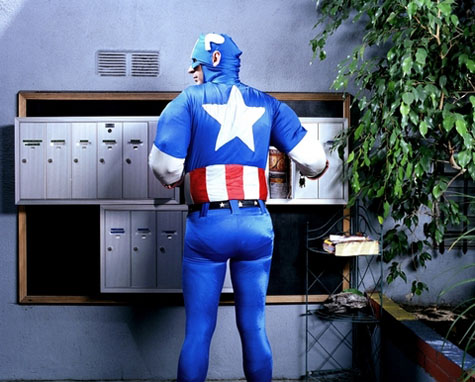 [Image: From the amazing Superheroes series by photographer Gregg Segal].
[Image: From the amazing Superheroes series by photographer Gregg Segal].As many readers will no doubt know, the New York Times last week sent a "cease and desist" letter to Apartment Therapy, demanding that AT stop posting New York Times proprietary material on their website.
Though the story has since undergone a few less confrontational developments – i.e. Apartment Therapy "reached both the NYTimes legal and marketing [departments] on Friday and they called off their take down notice pending our initial conversation" – the issue is still a very valid one, and it cuts to the heart of many financial problems now facing both print and online media.
As but one example, it has always struck me as somewhat economically lopsided that in order for Dwell to run a photograph in the magazine, we have to pay the photographer a not inconsiderable use fee; but that I, as BLDGBLOG, can simply post that photograph – or Dezeen can post it, or materialicious, or Apartment Therapy – and, at least for now, no one has to pay a cent. (See further thoughts on this sentence in the comment thread, below).
In this business model, magazines like Dwell and Wallpaper – or the New York Times – become a kind of unacknowledged production budget for architecture blogs (this site included). Metropolis pays for a photographer to fly to, say, Chicago or Melbourne or Eagle Rock... and an architecture blog then gets free photographs to post on their website, from which they can earn a constant stream of advertising revenue.
From the perspective of an architecture and design blogger, it can't help but feel a bit like the easy money days of the derivatives market: you wait till someone else pays for a photographer to document something, and then you jump in and skim ad revenue off of that transaction.
The value of your website is derived value; if the magazine photography economy were to collapse, so would your third-party ability to extract revenue from it.
While I was Senior Editor at Dwell, this hit some particularly surreal notes, such as when an architecture blogger – whose entire visual content has been bought and paid for by other people – emailed me to accuse Dwell of stealing from architecture blogs because we had run images (at no small expense to us) of houses that once appeared on that person's website.
In any case, my point here is not to argue, regressively, from the standpoint of magazines (after all, BLDGBLOG has been around for 5 years, hosting other people's photographs) or to advance a kind of 1990s-era model of intellectual property, but to point out that this conversation is far from resolved – and that I'm thus particularly excited to announce that Postopolis! LA will include an entire panel about this very subject.
Catherine Ledner, Dave Lauridsen, Gregg Segal, Misha Gravenor, and Tom Fowlks, professional photographers who have worked for the likes of National Geographic, Wired, Newsweek, Dwell, Popular Science, Esquire, the New York Times Magazine, and countless others, will be joining us on Saturday, April 4, to talk about the financial and/or reputational pros and cons of blogs, magazines, online portfolios, Flickr accounts, and so on.
It's interesting, for instance, in this context, that even mundane technical questions – such as whether to host your work online via a Flash website (which prevents bloggers from downloading your work) – are actually legally motivated decisions made to protect the financial integrity of your portfolio, not aesthetic or stylistic choices at all.
So what do these photographers think of Flash as a form of self-protection? Or of seeing their work on architecture blogs – or, for that matter, of never seeing their work on architecture blogs? Does this result in more (or fewer) paid commissions? What is the ideal balance here between exposure and financial compensation?
The questions are innumerable, and come as part and parcel of the ongoing implosion of the publishing industry, with newspapers and magazines folding (or laying off staff) left and right, and with no realistic new business model yet taking shape.
Watch for this panel coming up on the evening on Saturday, April 4. It will take place in the context of an entire day themed about the future of media, with editors-in-chief, bloggers, journalists, and many more on hand to discuss the changing industrial landscape.
By the way, the complete Postopolis! LA schedule will be announced shortly – so stay tuned!
No comments:
Post a Comment